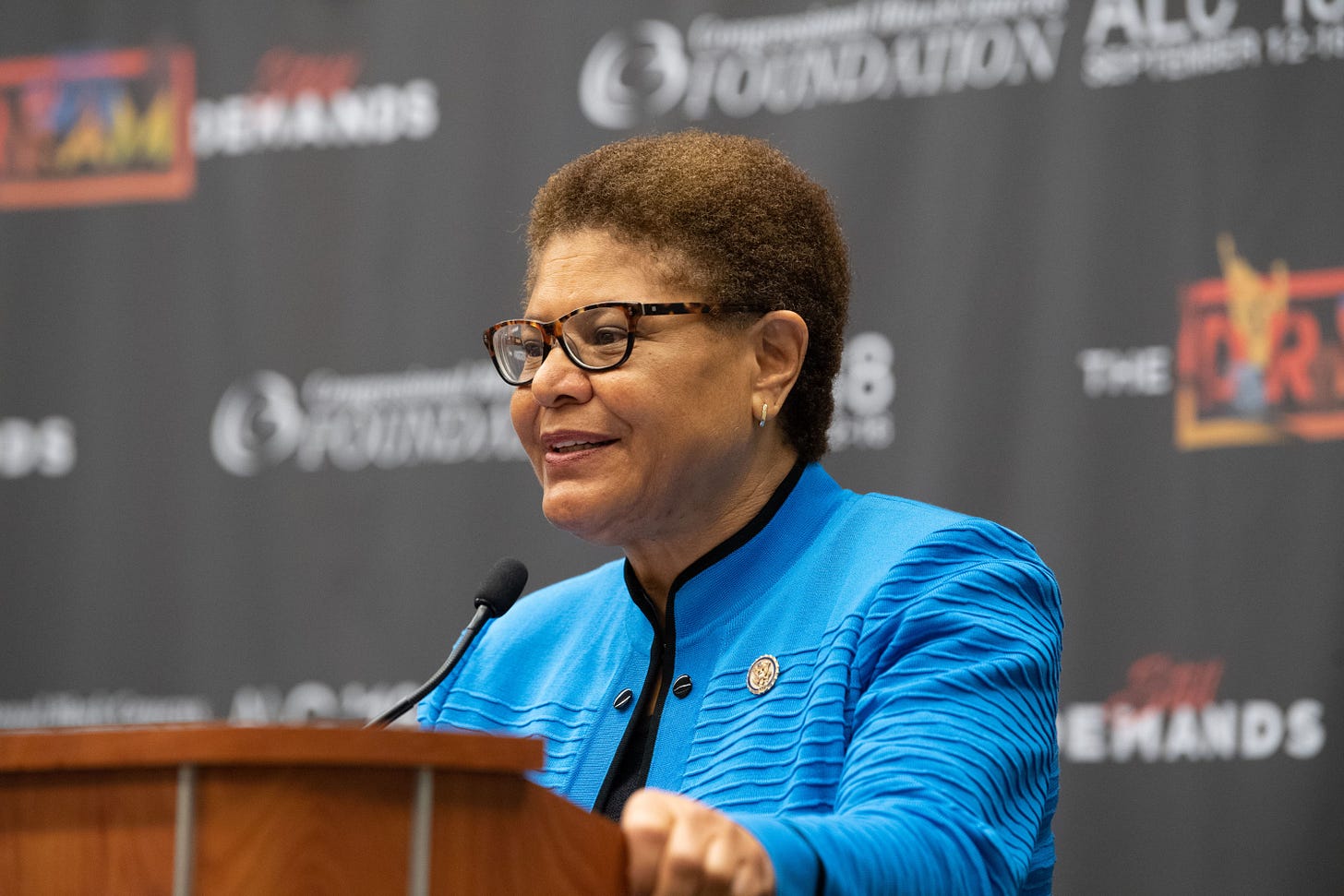Biden’s VP Pick: The Case for Competence
Karen Bass and Gina Raimondo both have solid policy and political chops.

Every day, the Biden campaign leans in to a series of contrasts with Donald Trump: community versus chaos, empathy versus ego, maturity versus “person woman man camera TV.”
There is another, bigger contrast underlying all the others: competence versus ineptitude.
Comparing America’s COVID-19 death toll with other advanced countries’ is a regular reminder of what happens when the head of the federal government is incompetent.
No one knows better than Biden that it didn’t have to be this way. Under the Obama administration, the government’s response both to a global economic crisis and a global pandemic was a model for the world. Our policies weren’t perfect, but the United States stopped the spread (of both the Ebola virus and the financial meltdown) and came roaring back.
When Biden ran the administration’s oversight of stimulus spending in 2009, fewer than 0.2 percent of the grants, loans, and contracts were suspected of waste and fraud, and congressional investigators found no evidence of malfeasance or favoritism. Millions of jobs were saved.
When Biden’s former chief of staff, Ron Klain, was appointed “Ebola czar” in 2014, America broke the back of the outbreak in Africa with only 11 confirmed cases reaching our shores.
The difference isn’t just ideology; it’s competence.
And as Biden considers whom to choose as his running mate, competence should be the most important qualification.
Historians differ on the political benefit of vice presidential nominees. What seems clear is that running mates generate more risk than reward. In the modern era, from Ferraro to Quayle to Palin, every time a presidential nominee hoped a Hail Mary pick might reshape the race—at best, it failed to deliver; at worst, it hurt the ticket.
So the first rule of VP selection should be: Do no harm.
The second rule of VP selection should be: Pick the person you believe will be your best partner and, potentially, your best successor. The vice presidency is still the surest route to the Oval Office. Almost one-third of vice presidents have gone on to become president, one way or another.
And even if the VP doesn’t wind up running the country, the office has been transformed from the time Franklin Roosevelt’s number two said it wasn’t worth “a pitcher of warm piss.” Ever since Jimmy Carter gave Walter Mondale an office in the West Wing, the vice president has (usually) been the second most powerful official in an administration.
Fortunately for Biden, two possible running mates pass those tests: Representative Karen Bass of California and Governor Gina Raimondo of Rhode Island. Neither of these women appears to be the frontrunner today, but both deserve the most serious consideration.
First, let’s take Bass. Like Biden, she is a master legislator. As speaker of the California Assembly—the first Black female leader of any legislative body in America—she won a Profile In Courage award for facing down political pressure and striking a deal with a Republican governor to address one of the worst budget crises in state history.
Once in Congress, she founded the caucus on foster youth and won bipartisan support for a child welfare bill signed by President Trump.
Following George Floyd’s murder, Bass united varied factions of Democrats behind a police-reform bill that bans chokeholds, changes qualified immunity, and mandates bias training—but avoids traps like defunding the police.
Bass is a committed progressive, but she’s also respected by Republicans, and revered by Democratic leaders, including Nancy Pelosi and Jim Clyburn, who have recommended her to Biden. At 66, with no national profile, Bass isn’t likely to treat the Biden administration as a platform for her own presidential campaign.
She would continue to be an effective policymaker and consensus-builder, in stark contrast to the status quo.
And then there’s Gina Raimondo, who might just be the best governor in America.
Raimondo’s career is a testament to the old fashioned idea that, with the right leadership, good policy is the best politics. Having watched her working-class dad lose his job when Rhode Island’s Bulova watch factory moved to China, Raimondo ran for office to bring economic opportunity back to her state. What she encountered was a pension system less than half funded and eating away at other public services.
Despite conventional wisdom that said pension reform was impossible—and political suicide to attempt—Raimondo built a coalition, passed her plan, and saved the system. She then won a tough Democratic primary for governor and the general election. Twice.
On COVID-19, Raimondo’s leadership was similar: Do the right thing now, worry about the politics later. She emulated South Korea and New Zealand, made tough decisions to shut down parts of the economy, scaled up testing and tracing, sent an unequivocal message to “wear your damn masks,” and wrestled the virus to the ground. Today, Rhode Island’s curve has flattened—and restaurants, beaches, day-care centers, even movie theaters are reopening. Despite myriad critics at the outset, two-thirds of the state supports Raimondo’s approach, which is the polar opposite of this president’s.
The press focuses on Trump’s Twitter tantrums and norm-breaking, but when it comes to driving voter behavior, competence is Trump’s kryptonite. Even Americans ideologically uncomfortable with Democrats recognize that we can’t go on like this.
Picking either Bass or Raimondo doubles down on Biden’s argument that what the presidency needs—just as much as decency and dignity—is knowledge and know-how.

